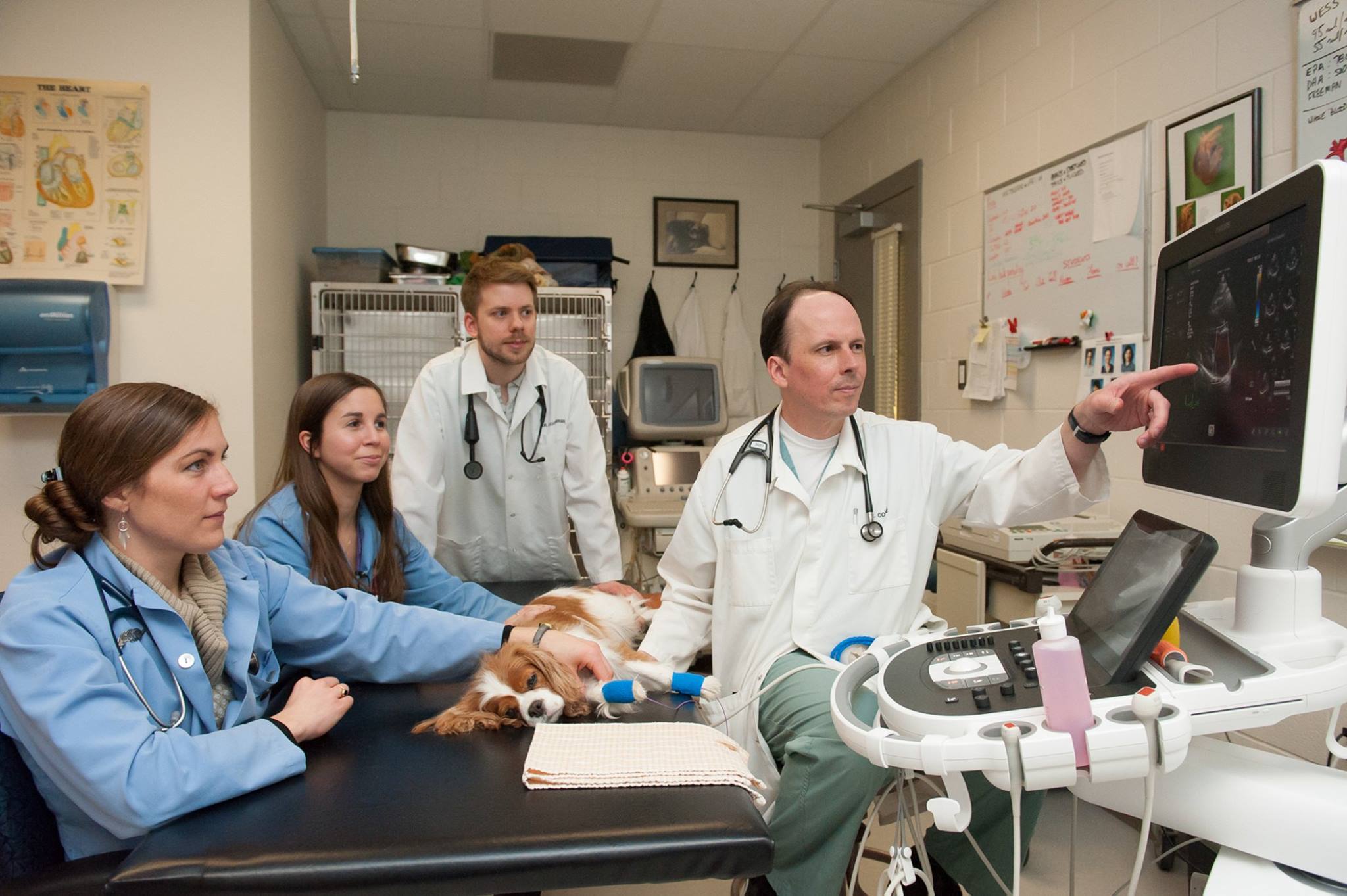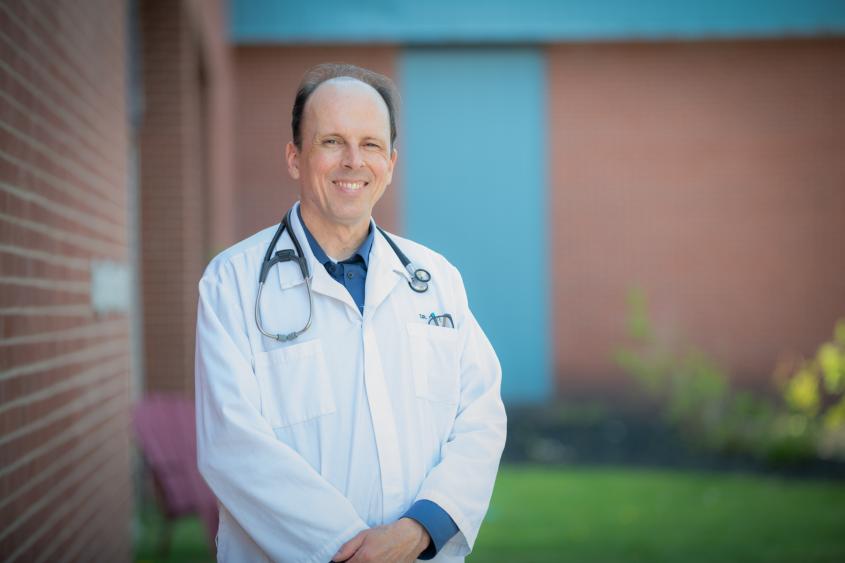Etienne Côté, D.V.M. ’93, earns college’s highest alumni honor
Like many veterinarians, Etienne Côté, D.V.M. '93, was inspired by famed English author and country veterinarian Dr. James Herriot. “I told myself, after reading all the James Herriot’s works in excess, that if I ever wrote a book, I would send it to him,” Côté says.
As fate would have it, Côté went on to write his own books. While Herriot had passed away by that time, he did send one copy to Herriot’s son Jim — also a veterinarian — who in turn invited him to Yorkshire for a visit.
“He was as wonderful, charming and jovial as you’d expect James Herriot’s son to be,” says Côté. The once-in-a-lifetime meeting was a befitting honor to Côté, whose dedication to the veterinary profession has now also been recognized through the Cornell University College of Veterinary Medicine (CVM)’s highest award for alumni— The Daniel Elmer Salmon Award for Distinguished Alumni Service. The award recognizes veterinary graduates who have distinguished themselves in service to the profession, their communities or to the college. It was established by the CVM Alumni Association in 1986 and named in honor of Cornell's first D.V.M. graduate, Daniel Elmer Salmon. Salmon is best remembered for his pioneering work in controlling contagious animal diseases in the early twentieth century and the bacterium Salmonella that was named in his honor. Côté is the youngest recipient of the recognition to date.
“Dr. Côté exemplifies the highest qualities of a College of Veterinary Medicine graduate,” says Lorin D. Warnick, D.V.M., Ph.D. '94, the Austin O. Hooey Dean of Veterinary Medicine. “His dedication to furthering veterinary medical knowledge and educating the next generation of veterinarians make him an outstanding choice for this year’s Salmon Award.”
Côté is board-certified in cardiology and small animal medicine, and works as faculty at the Atlantic Veterinary College, University of Prince Edward Island in Canada. His role there is a blend of clinical practice and teaching, and has won him numerous teaching awards, including Canada’s highest recognition in postsecondary teaching, the 3M National Teaching Fellowship.
Despite his numerous accomplishments, Côté is humble and almost reluctant to elaborate on them. He’d rather focus on the people and places that influenced his career. Chiefly among them, of course, is Cornell itself. He’d set his sights on attending CVM when he was in college and attended a talk at the Trotting Horse Museum in Goshen, New York, where former CVM faculty member and anatomist Dr. Wolfgang Sack lectured on the suspensory mechanism of the hindlimb of the horse. “It seemed like such a dry topic. But he was so animated. In no time, he was standing on a table, putting all his weight on a preserved model of the equine hindlimb. It was unforgettable,” says Côté. “I knew then that no matter what, I wanted to go to Cornell.”
He very nearly didn’t; on a list of 81 accepted students, Côté says he was the 81st — so far down the line, that he had already rented an apartment in another city in preparation to attend a different school. “It didn’t seem like it would happen, but then, on August 2, I got that call,” he says.
Coming to Cornell for veterinary school was a “transformation point” for Côté. “I arrived with googly-eyed wonder.” He recalls when he first walked into the CVM library (in its former location on the second floor of Schurman Hall) and seeing the oil painting portraits of former deans hanging on the wall. “I was in awe. Coming to Cornell was eye-opening in the most wonderful way.”
On mentors and mentoring
Many teachers left lasting impressions on Côté. Dr. Cornelia (Nelly) Farnum, the James Law Professor of Anatomy, emerita, he recalls as a “brilliant and forward-thinking educator,” along with Alexander de Lahunta, D.V.M. '58, Ph.D. '63, also the James Law Professor of Anatomy; Dr. Sydney Moïse, professor emerita of Cardiology; Dr. Robert Gilmour, former associate dean for research and graduate education; Dr. William Hornbuckle, the Rudolph J. and Katherine L. Steffen Professor Emeritus of Veterinary Medicine; Dr. Sharon Center, the James Law Professor of Internal Medicine; and Dr. Wayne Schwark, professor of pharmacology. “He was another phenomenal educator, somebody who combined basic science and clinical knowledge in a way that I dream of doing.” Côté would go on to create a pharmacology app with Schwark and notable alumnus Stephen Ettinger '62, D.V.M. '64, that has been used as a tool by many veterinary practitioners.
Côté needn’t dream. By all accounts, he is more than following in his mentors’ footsteps.
“He has contributed to many facets of our profession,” says Julio Lopez, D.V.M. ’08, who first met Côté during his senior year cardiology externship at the University of Prince Edward Island, “including as professor, author, award winning lecturer at conferences, in organized veterinary medicine — but most importantly, as a great person who has touched the lives of many veterinary students like myself.”
Joseph Wakshlag, D.V.M. ’98, Ph.D. ’05, professor of clinical nutrition at the college, echoes the sentiment. “His influence on the veterinary profession as a whole has been more impactful than any other Cornellian that I know of since the days of Kirk and de Lahunta. His name is synonymous with the ‘Clinical Veterinary Advisor,’ which is on every shelf/tablet of general practitioners and specialist alike.” Wakshlag continues, “I cannot think of a more impactful alumnus who is deserving of this award who has touched the lives of the entire veterinary community.”
After graduating, Côté made his way to the California Animal Hospital Veterinary Specialty Group, run by Ettinger, himself a former winner of the Salmon Award. There, under Ettinger’s tutelage, Côté developed a keen interest in small animal internal medicine and cardiology.
“My dual interest in those two areas is all Steve Ettinger’s doing. He showed me that it’s possible to help a lot of people and their animals,” says Côté. California Animal Hospital was an exceptionally busy, high-level hospital with a constant stream of cases ranging from the routine to the extraordinary, he says. Mentorship was enviable, with specialists reviewing each case with interns in real time, no matter what time of day or night — an incredible example of support and clinical teaching that Côté has tried to imitate. He notes Ettinger’s influence especially around communication: understanding how to talk and work with clients effectively day to day, and also for larger-scope projects like writing articles and textbook chapters to communicate with fellow veterinarians. “I got the building blocks of a career at Cornell, and Steve Ettinger showed me how to build a house,” Côté says.
After completing his postgraduate internship and residency training there, he joined the Angell Memorial Animal Hospital in Boston, and then accepted a faculty position at the Atlantic Veterinary College at the University of Prince Edward Island in eastern Canada. There, Côté oversaw the development of the cardiology service, created the cardiology residency and master’s postgraduate program, and was rewarded with multiple excellence in teaching awards.
Côté thoroughly enjoys playing the mentor himself. “Like many teaching clinicians, I enjoy that lightbulb moment for students,” he says, “they’ve read about something, and then they finally get to see it and it comes together — it’s just a joy.”

Leader in the field
Côté has been author of over 40 peer-reviewed publications. As noted by Wakshlag, his “Clinical Veterinary Advisor” has worldwide recognition and is used by students and practitioners alike. He’s also contributed heavily to Ettinger’s “Textbook of Veterinary Internal Medicine,” an encyclopedic source for detailed information in the small animal veterinary field, and is co-editor-in-chief of the upcoming edition along with Ettinger and Dr. Edward Feldman.
Côté was elected to the Presidency of the American College of Veterinary Internal Medicine - Specialty of Cardiology in 2017, where he led an initiative to deliver clinical communication training to residents and specialists - the first specialty organization to do so. He’s also served as an active member of the Board of Regents of the American College of Veterinary Internal Medicine and is a Fellow of the Canadian Academy of Health Sciences, an organization that works on issues and opportunities in human and veterinary health care. He chairs the Veterinary Specialty Interest Group of the American Society of Echocardiography, a 17,000-member organization of physicians, sonographers, and scientists with a professional focus on cardiac ultrasound. He has been elected to membership in the American College of Cardiology and has been elected to fellowship in that prestigious organization.
“He has worked tirelessly to improve academic education through his university teaching and his worldwide lectures,” says Ettinger. Not only that, Côté has delivered over 300 lectures in over 20 countries during his three-decade veterinary career, and is fluent and conversant in English, French and Spanish.
For Côté, his mixture of teaching and clinical practice “is the best job — one aspect feeds into the other.” When asked on what advice he’d give to new and aspiring veterinarians, Côté’s first response is a self-effacing Mark Twain quote: “I recommend you not take advice from people like me.” When pressed, he notes that, while the veterinary profession is one filled with intensity and drive, that “there is so much absurdity to enjoy.”
He recalls his own class finding comedy among the rigors of their veterinary curriculum — including being the originators of a now-famous prank — the painting of the “F.H. Fox Is” graffiti that runs across a rusty pedestrian bridge across Route 366 in Varna, just a few miles down the road from the college. “There may or may not have been some folks who found some spare paint cans in their apartment’s basement …”
Côté has also found time to give back to Cornell by serving on the CVM Dean’s Leadership Committee from 2008 to 2013. When asked why he looks to support his alma mater, he credits a good deal of his Cornellian spirit to his mentor Ettinger (“There’s no prouder Cornellian”) and also to the fact that Cornell “is the foundation of it all. In the sheer things that I learned, the quality of the education.”
Says Côté, “I got to see what the outer limits are of excellence in veterinary education, and that we can push beyond them.”
Written by Lauren Cahoon Roberts






